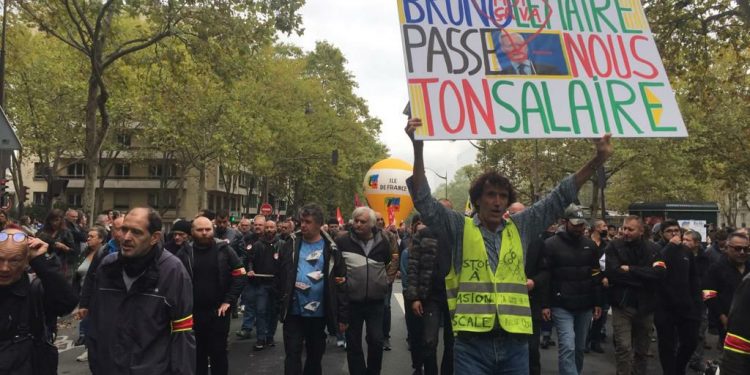By Miguel Angel Hernandez, leader of the PSL, Venezuelan section of the IWU-FI.
19 October 2022
On 18 October, a national day of protest took place throughout France, with strikes in various sectors and mobilisations in some 140 cities and towns across the country.
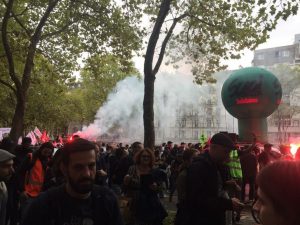
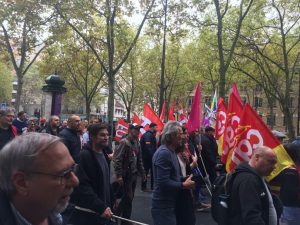
The action was called by the trade union centres CGT, Force Ouvrière (FO), the Fédération Syndicale Unitaire (FSU), the union Solidaires, and four student organisations, demanding wage increases, in defence of the right to strike and to support the workers of the oil company TotalEnergies, who have been on strike since the end of September.
At the heart of the protest is the demand for a general wage increase to 2000 euros, i.e. 300 euros more than the current wage. In a country where the inflationary spiral is advancing, especially in foodstuffs, which have experienced a 10 per cent increase, while wages remain stagnant.
The day of protest, which brought the country to a standstill, was joined by workers from the health sector, education, and public employees, as well as transport workers, oil workers, and workers from 11 of the 19 nuclear power stations. In Paris, over 40,000 workers and youth mobilised one of the 140 marches that took place all over the country.
#18Oct Jornada de protesta por salarios en Paris pic.twitter.com/qAXS4hgHR5
— Miguel Angel Hernández Arvelo (@UcvMiguelangel) October 18, 2022
The strike on Tuesday 18 had a particular impact on the regional trains, with only half of them running. On the rail routes near the capital, the stoppage would have been 25 per cent. City buses were also affected, with a third of their lines suspended. There was also a strike on the metro. There were rail restrictions on the connection between France and Spain, as well as between Paris and London. In the education and health sectors, the strike was partial. However, the organisers of the day of protest threatened to continue the strike action in the coming days.
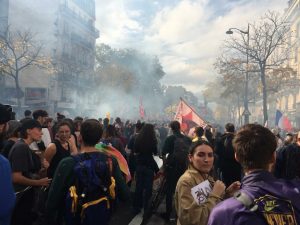
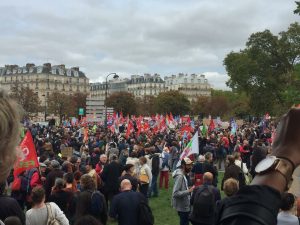
The strike action was preceded by a march “against expensive life”, held on Sunday 16 in Paris, called by left-wing organisations, in which some 100,000 people are said to have taken part.
#16Oct París: ni Putin, ni Macron, ni Biden pic.twitter.com/deqitXLDtl
— Miguel Angel Hernández Arvelo (@UcvMiguelangel) October 18, 2022
Growing social unrest
The “hot October” in France is a consequence of the great social unrest that has been accumulating in Europe’s second largest economy, because of the abrupt fall in the standard of living of French workers, because of the increase in inflation, which contrasts with the high profits got by the oil and petrochemical companies. This produced a strong repudiation by the workers, who see how the big transnationals continue to profit amid the economic crisis aggravated by Putin’s invasion of Ukraine.
Oil workers’ strike continues
The big day of protest comes against the backdrop of a strike in the refineries of the oil company TotalEnergies, which began at the end of September, for higher wages. The union is demanding a 6 per cent wage increase, while the transnational oil company is reported to have made a profit of 8 billion euros.
TotalEnergies, like most oil and petrochemical companies, has made record profits, thanks to the increase in energy prices because of the worsening capitalist economic crisis, exacerbated by Russia’s invasion of Ukraine, and the sanctions imposed on Russia.
The oil refinery strike reduced gasoline production by over 60 per cent, leaving 1 in 3 gas stations short of fuel, creating long lines to fill up vehicles. However, Macron’s right-wing government forcibly reinstated many Total workers, reducing the shortage to 30%. This action by the government produced a great rejection among many workers who considered the measure as a restriction of the right to strike.
All this comes when Macron’s government intends to pass the 2023 budget in parliament through a fast-track mechanism, provided for by the constitution, and has pending a pension reform to raise the retirement age from 62 to 65. In 2019, this reform was stopped by the workers’ and popular mobilisation.
From the IWU-FI we support the strikes, especially those of the oil workers, and the mobilisation of French workers and youth, who today are fighting for wages, against inflation and the austerity measures of the Macron government. We reject the restrictions on the right to strike imposed by your government on the oil workers of TotalEnergies.
We hope that the days of protest will continue towards a general strike, and that in the heat of the struggle, workers and youth will organise themselves in the perspective of forming a revolutionary socialist alternative to confront the government and its austerity measures.









